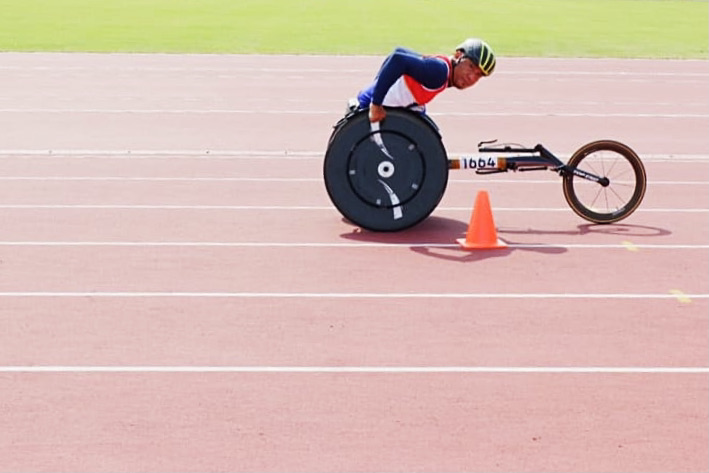
Jerrold Mangliwan hopes his stint in the Paralympics will open people’s minds more about PWDs. PHILIPPINE SPORTS COMMISSION
Jerrold Pete Mangliwan’s face lit up when asked about what he intends to accomplish in the Paralympic Games in Tokyo.
There were so many in his list: Tabbing a medal in the global showcase. Making his old pal Harold Ilagan—the very man who nudged him into wheelchair racing—proud. And then there’s simply getting better at launching in the T52 men’s 100-meter race, where he usually struggles.
But according to the 41-year-old track wheelchair racer, the one thing he really wants to achieve is use the Tokyo Paralympics as a platform to rewrite the narratives surrounding persons with disabilities (PWDs).
“I’ve had plenty of experiences as a PWD,” Mangliwan told the Inquirer before departing for Tokyo. “[As someone with an impairment], you are bound to deal with a lot of challenges.”
“As we all know, physically, we are challenged. Most of the times, the environment [we are in] are not that friendly towards PWDs. And then there’s the way how people treat us,” he said.
“I want to show everyone that what they usually think of us (PWDs) has to change,” the Kalinga-born athlete said.
Lane violation
Mangliwan qualified for the final of the 400-meter T52 race on Friday at Japan National Stadium. He was disqualified during the medal race, however, after committing a lane infringement violation.
But he still has more events on tap to showcase his skills—preach his belief.
Mangliwan, who competed in the Rio de Janeiro Para Games, will hunt for medals in the 1500m race this Sunday, and his dreaded 100m contest on Friday next week.
“I really want to change how things are,” the 16-year national team veteran, a double gold medalist during the 2015 ASEAN Para Games in Singapore, said. “I’m not saying that nothing’s going right for our sector, but I’m speaking from our realities. I lived through them myself.”
The 100m race is a thorn to Mangliwan’s side mostly because of his penchant for slow starts. In the 400m, Mangliwan again had to play catch up during the qualifying heats.
“Jerrold usually starts slow, a weakness that we have to correct and develop,’’ said coach Joel Deriada after Mangliwan placed seventh overall in the qualifying heats to secure a spot in the eight-person finals.
Mangliwan, who likewise made it to the medal race during the 2016 Rio De Janeiro Paralympics, clocked one minute and 3.41 seconds to end up fourth in the first of two heats.
Defending champion Martin Raymond of the United States, who is of Filipino and Irish descent qualified with the second fastest time of 57.70 seconds, behind top qualifier Tomoki Sato of Japan (57.33). Raymond is the defending champion of the event.
“He (Mangliwan) was left behind at the beginning of the race, but was able to recover halfway through,’’ said Deriada, who watched the race live via video streaming after being grounded in Manila after testing positive for COVID-19 before the delegation left for the Japanese capital.
Gold winner
Sato eventually won the gold medal in 55.39 seconds, pipping Raymond (55.59) at the finish.
Mangliwan registered an official personal best of 1:02.17 at the World Para Athletics Grand Prix in Nottwil, Switzerland last May. He posted his fastest clocking of 1:00.97 in winning the silver in the same event during the 2015 APG held in Singapore. But it was not recognized because the meet was not sanctioned by the International Paralympic Committee, according to Deriada.
Swimmer Ernie Gawilan, meanwhile, fell short of claiming a spot in the finals of the men’s 200m individual medley SM7 after finishing ninth overall in the heats.
Only eight swimmers advanced to the final, but Gawilan will be an alternate just in case one of the qualifiers back out.
Despite the early exit, Gawilan recorded a personal best of 2:50.49, faster than the 2:52 clocking he set in capturing the gold medal during the 2018 Asian Para Games in Indonesia.

